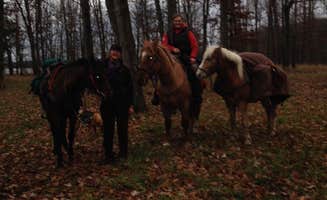Equestrian camping near Traverse City, Michigan offers rustic accommodation amid 300,000+ acres of state forest land. The terrain features rolling hills with elevations ranging from 600-1,200 feet, creating varied riding conditions across mixed hardwood forests. Summer temperatures average 75-80°F during day with cooler 55-60°F evenings, making lightweight layering essential for riders.
What to Do
Trail riding access: At Marzinski Horse Trail Campground in Manistee National Forest, equestrians can access multiple interconnected trails. "The pine trees are amazing and the road in was super accessible. 20 min to town to restock with plenty of gas stations on the way," notes Cameron, who appreciates the campground's convenient location.
River tubing: Many equestrian campers enjoy river recreation when not riding. "The river runs by and is awesome to go tubing down," shares Gemma G. about the Boardman River that flows beside the horse camping area.
Mountain biking: The state forests surrounding Traverse City offer dual-use trails for both horses and bikes. At Lake Dubonnet Trail Camp, "A couple nice hike/bike trails spur off the campground," according to Emily V., making it ideal for groups with varied outdoor interests.
Kayaking and canoeing: Several equestrian campgrounds offer paddling opportunities. Anna B. notes that Scheck's Place provides "Rustic campground with access to the Boardman river and many miles of trails in the state forest," creating a perfect basecamp for both riding and paddling adventures.
What Campers Like
Uncrowded camping: Most horseback riders appreciate the low-density nature of equestrian campgrounds. Jay F. notes that Scheck's Place State Forest Campground is "very secluded in the State Forest but only a half hour from downtown Traverse City," offering both isolation and convenience.
Self-registration flexibility: Equestrian camps typically operate with payment drop boxes and flexible site selection. Kate K. describes Lake Dubonnet as having "Self registration for $15 per night. Campsites include fire pit and access to vault toilets," allowing riders to arrive on their own schedule.
Spacious sites: Horse camping requires more room than standard camping, and the campgrounds deliver. At Marzinski Horse Trail Campground, evi L. reports "The campsites are all flat and quite large, being that they are meant to accommodate people with a horse trailer, and there are numerous hitching posts throughout the campground."
Multi-use facilities: Many horseback riders appreciate campgrounds that accommodate various activities. "This facility meets the recreation need of a diverse cross section of Michigan residents. It's a great home base or overnight camp for canoeists and kayakers... The camp is also used by mountain bikers & gravel riders, ATV riders, anglers, and equestrians," writes Jay F.
What You Should Know
Rustic amenities: Equestrian camping near Traverse City means basic facilities. "Rustic means vault toilets, no power and hand pump water. No reservations — FCFS," explains Jay F., setting appropriate expectations for comfort levels.
Seasonal considerations: Most horse camps have limited operating seasons. At 4-Mile Trail Camp DNR, Lexi G. notes, "It's never busy here. I don't have horses but I've seen people stay with horse trailers with their tie outs to the poles that are designed for it," suggesting it's a good option during busier summer periods.
Water sources: Finding water for horses requires planning. Caryssa R. appreciates that Lake Dubonnet has a "spickit with really good water," though riders should bring containers for transporting water to horse areas.
Road conditions: Access roads vary in quality. Cameron found Marzinski's "road in was super accessible," but other forest routes may require high-clearance vehicles, especially for towing horse trailers.
Tips for Camping with Families
Fishing opportunities: Kids can enjoy fishing while adults tend to horses. Dalton B. describes Lake Dubonnet as "located on the N.W. shore of the Lake Dubonnet resovoir. Rustic, cheap, horse friendly, out house, and pleanty of forest and lake to explore."
Swimming access: When temperatures rise, water access becomes important. At Turtle Lake Campground, Chris R. notes they "have water and electric hookup sites. Water access is readily available with easy approaches to Lake Dubonnet for horses," which benefits both equine and human swimmers.
Playground availability: Some campgrounds offer kid-specific amenities. Ann D. appreciates that Turtle Lake "provides a bit more of a grassy setting and offers a nice playground. The bathrooms were redone and are very nice!"
Privacy considerations: Family camping requires space. Thomas H. notes that at Lake Dubonnet, "Campsites are large and fairly separated!" allowing families to maintain their own space while camping with horses.
Tips from RVers
Access challenges: Large RVs with horse trailers require special consideration. The Northwestern Michigan Fairgrounds offers alternatives during peak season, with Jim noting, "Sites are level. No landscaping. Lots of restaurants and attractions in Traverse City."
Hookup availability: Most equestrian camps lack electrical hookups. For those needing power, Lon L. notes at Northwestern Michigan Fairgrounds, "Water on all outside sites. interior sites share water hookups," providing options for RVers with horses.
Site leveling: Horse trailers and RVs require level ground. Ray & Terri F. caution about potential site conditions: "Our site had a fair bit of slope side to side, which I mentioned to the person that led us to our site."
Seasonal limitations: RVers should note most equestrian campgrounds have limited seasons. Mario F. advises planning ahead: "From site to the nearest store 15-20 min away..If needed...Had no issues."


